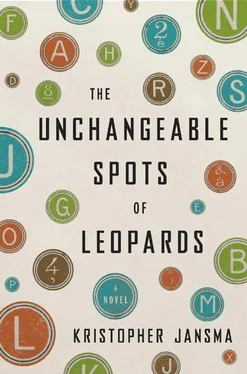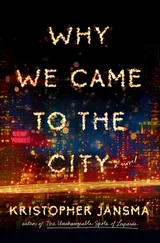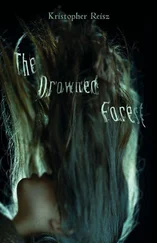With my last bit of strength, I lift the box of wine onto the sled and prepare to make a special delivery. This time when I leap into the sled, it inches forward, and I gain a little momentum, and then a little more, and soon I am speeding downhill through a sheet of white spray like an eager child. I can’t think of the last time I was so happy.
At the bottom finally, I crane my neck to the top of the old bell tower, peering through the falling snow. Are there faint signs of flickering light in the small dark cutaways? I can’t tell if it is a trick of the darkness.
As I climb the stairs slowly, propping the box of wine up against the handrail, I wonder what I will find at the top. I try not to make assumptions based on the empty Brennivín bottles that I keep stumbling upon, which go skipping off down the spiral staircase and shatter fantastically on the flagstone below. But I brace myself for the increasing likelihood that Jeffrey is soaked through like a ladyfinger in a caraway tiramisu. He could be rocking gently in a corner, talking to himself — the result of months without any medication. Or, considering how it gets colder and colder with every foot that I raise, will I find only a Jeffrey Oakes — flavored Popsicle? With each step my leg throbs harder and the sound of typing grows louder.
The staircase seems never ending, and after what feels like a mile, I collapse onto one of the frigid steps. I feel the sweat on my pants’ seat freezing to the stone. Not for the first time, I think about what little I’d be leaving behind, if I was to give up and let myself pass out in the cold, cold tower. Hypothermia has me in its grip — all that remains is for me to let it take me. What did anyone really leave behind, I wonder. A family? A home? All I’d ever wanted to remain in my wake was a book. A simple, stupid mass of words. And I’d failed, even at that.
The hammering of typewriter arms against an inky strip echoes down the tower. I seize the box of wine and force myself up against the wall. The typing stops. I feel the fabric rip out of my pants. It remains, iced to the step. A roller is rolled; a sheet extracted and replaced. I command one leg, and then the other, to lift. The typing begins anew.
And for this imperfect immortality, what prices have been paid? How many livers, lungs, and veins? Shredded, polluted, shot? How many children deserted, family secrets betrayed, sordid trysts laid out for strangers to see? How many wives and husbands shoved to the side? How many ovens scorched with our hair? Gun barrels slid between our lips? Bathtubs slowly reddened by our blood and twisting rivers that drowned us? How many flawed pages burned in disgust and reduced to ashes? How many flawless moments observed from just a slight distance so that, later, we might reduce them to words? All with an unspoken prayer that these hard-won truths might outlast the brief years of our lies.
At last I arrive at the top. As I catch what breath I have left, I think back to the last time I saw Jeffrey. I told him he was insane. He called me a fantasist. Neither accusation had been untrue, and yet I wondered if he had injured me half as much as I had injured him. After all, my hopeless cause was only love; his was everything. His entire mind. Over the years, I’d wondered once or twice if he’d seen his breakdown coming. Surely, he must have; Jeffrey was never unobservant, and there was little he was more absorbed by than himself. He must have known the day he signed the contracts that he was signing away his only life preserver — the book that had buoyed him up while all else whirled him down and down in spirals that grew with each passing month. With every milligram of Lotosil that had worked just a little less well than the milligram before. With every substitution he’d tried to make that only came up short. What sort of courage had it taken to let go of the last thing keeping him afloat?
Leaning against the door, I wonder if maybe I’ve been clinging to a life preserver all my own. I wonder if he can show me how to let it go.
At last I push open the door to find Jeffrey, typing away at a little desk, on the same little Icelandic typewriter I have back in my room. Beside him is a stack of paper, perhaps a foot high — it looks like almost a thousand pages — weighted down with a half-empty Brennivín bottle. As I step in, he catches sight of my reflection in a tarnished mirror on the wall, but still the typing doesn’t stop.
“Just leave the box by the door, thank you,” he says, without breaking eye contact with his page.
I set the box down and my leg spasms so badly I can’t walk another step. The click-clack of the keys echoes through the room, bouncing off the stone. I come around behind him so that he will see me clearly, and in the process I pass the mirror and get the first good look at myself that I’ve had in weeks. No wonder why the others in the colony have been shrinking away from me. Even by the low standards of writers, I look deranged. Beard shaggy in some places and patchy in others. My eyes bloodshot and underlined in inky purple rings. Skin so pale that I swear I can see my skull through it.
“I was told that no tips were required,” Jeffrey says loudly, the typing slowing but not stopping, his eyes drifting up but not breaking his stare. “But if you insist, there should be some kronor or something in my bag. Front pocket.”
Stepping forward so he can see me better, I smile wanly at my old friend, and at last, his eyes lock onto mine. The typing stops suddenly.
“Good God,” Jeffrey says, jumping up from the desk. He winces and immediately collapses back into his chair. He looks nearly as terrible as I do.
“I haven’t stood up in a while,” he admits. From the intensity of his face, I am guessing that “a while” is on the order of a magnitude of days, not hours. From the smell of the place I guess he’s been relieving himself in empty bottles and subsisting only on the full ones. He keeps glancing back at his reflection, as if worried it might run away from him while he’s looking the other way. I’ve seen him like this before.
“Your mother asked me to come,” I explain. “She wants you to go home.”
Jeffrey stares at the typewriter in the mirror for a few minutes. “I haven’t quite finished. Just another chapter or two. Should be done by morning. Tomorrow we’ll go.”
“There’s nobody running this place,” I say. “And the snow’s starting to let up. We should go while we can. Tomorrow might be too late.”
“Have a drink,” he says, offering the bottle of Brennivín. As he lifts it, the top pages of his stack blow off and I catch one in the air.
“That’s not finished yet!” he shouts, struggling to get back to his feet but failing.
I scan a line from the middle of the page:
and here, almost against his deadish look at the man; it is life, as it hasn’t been; no promise of redemption visible; in the man others found it that the man had not found; firm lips and eyes open, oh and that self-same expression as in life and it is as it hasn’t been and the looking in is nothing and nothing, through the head goes the point
There isn’t a period to be found on the page. There aren’t any on the page that tops the stack, and I wouldn’t have been surprised to learn there weren’t any in the whole manuscript. I wonder if he’s been typing all of this without looking at it — and yet somehow he’s also cleverly avoided any words containing c, q, w , or z . I put the pages back and set the bottle on top of them again.
Poor bastard. He’d leapfrogged his Ulysses and gone right to his Finnegans Wake . He begins to cough and cough, for a solid minute. While I wait for him to stop, I pry the lid off the box of wine and stack the ’98 Petit Pineaus out on the floor. I have no idea how much they cost, but they can’t be as priceless as a thousand pages of Oakes. So I scoop up the manuscript pages and set them evenly inside the box. By the time I get the lid back on, Jeffrey has propelled himself halfway across the room on his weakened legs. I see blood on the back of his hand when he finally moves it away.
Читать дальше











